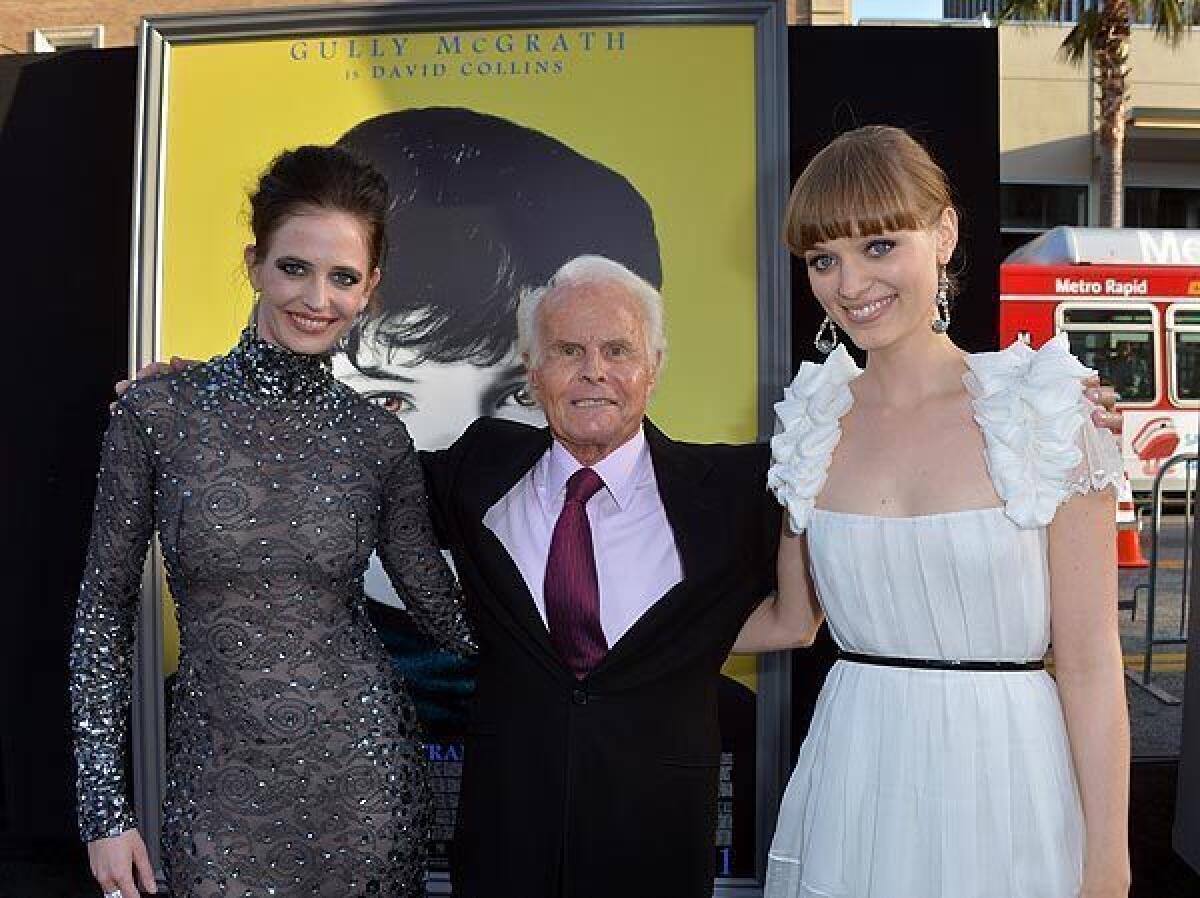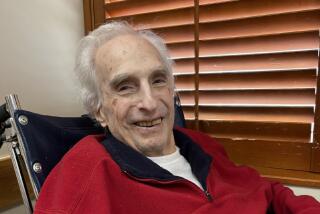Richard Zanuck dies at 77; Oscar-winning producer

One day in 1962, the Hollywood legend Darryl F. Zanuck turned to his 27-year-old son, Richard, seeking advice.
Whom, the elder Zanuck asked, should he appoint head of production of 20th Century Fox, which had fallen on hard times and was losing millions on the problem-plagued “Cleopatra” starring Elizabeth Taylor and Richard Burton.
Richard Zanuck gave his father — a co-founder of Fox – a piece of paper with a single word on it: Me.
Dad took his son’s recommendation and, over the next five decades, Richard Zanuck emerged from the shadow of his father at the studio and eventually became an Oscar-winning independent producer of such films as “Jaws,” which ushered in the modern blockbuster era. He followed with well-regarded films such as “The Verdict,” and “Driving Miss Daisy.”
Zanuck, who was 77, died Friday morning of a heart attack at his Beverly Hills home, said his publicist, Jeff Sanderson.
FOR THE RECORD:
Richard Zanuck obituary: The obituary of movie producer Richard Zanuck in the July 14 Section A included an incomplete list of Zanuck’s survivors. In addition to his wife, Lili Fini Zanuck, sons, Harrison and Dean, and at least nine grandchildren, Zanuck is survived by two daughters, Virginia and Janet, with his first wife, Lili Gentle. —
While in his 20s and 30s, Zanuck oversaw production at 20th Century Fox, where he nurtured great films and filmmakers and helped the studio collect a long string of Oscars. As a producer, he shepherded the careers of blockbuster directors Steven Spielberg and Tim Burton.
“He taught me everything I know about producing,” Spielberg, who considered him a director’s producer, said in a statement Friday. “He was one of the most honorable and loyal men of our profession, and he fought tooth and nail for his directors. Dick Zanuck was a cornerstone of our industry.”
Tim Burton said in a statement: “I’m in shock and heartbroken. He was like family to me — a mentor, friend and father figure. Richard was a completely unique and amazing individual, and there will never be anyone else like him. I’m too sad to speak more about it right now and need some time to mourn.”
Clint Eastwood, who was involved with Zanuck on his films “The Eiger Sanction” and “True Crime,” said he was “a great asset” for a director to have.
“He could watch your back, so to speak,” Eastwood said Friday. “He also had good taste and could be very helpful.... A lot of producers are producers in name only; he was the real deal.”
Unlike many of his Hollywood contemporaries, Zanuck, the only son of 20th Century Fox’s original production chief, comfortably straddled the lines between commercial and critical success.
He won the best picture Oscar for “Driving Miss Daisy,” and several of his more popular films were embraced by audiences and reviewers alike, including “Road to Perdition” and “Cocoon.” Perhaps his greatest legacy, though, was in launching the modern blockbuster era with Spielberg’s 1975 great white shark smash “Jaws,” which adjusted for inflation grossed more than “Ben-Hur” and “Avatar.”
Compared to modern studio production heads, who are obligated to churn out sequels, remakes and mindless popcorn fare, Zanuck as the studio’s head of production in the 1960s championed an eclectic slate driven by strong stories and visionary directors.
Producer Joe Roth, who collaborated with Zanuck and Tim Burton on the $1-billion smash hit “Alice in Wonderland,” said of Zanuck on Friday: “He’s the history of Hollywood. He knew everything about producing movies. He’s seen it all. He was someone I idolized.”
“I’m pretty shocked,” Roth said of Zanuck’s sudden death. “He was the kind of person you thought was going to live forever. He ran every day, had zero body fat, played tennis and didn’t drink.”
Teamed with former Fox associate David Brown in the Zanuck/Brown Company in the 1970s and ‘80s, Zanuck and his partner produced Spielberg’s first feature film (1974’s “The Sugarland Express”) and his second film a year later: the blockbuster “Jaws,” which caused countless moviegoers to rethink their summer vacation plans to the seashore.
“Not until the first preview in Dallas, not until the shark jumped out of the water, did we know that we had a monster hit,” Zanuck recalled in 2005 on CBS’ “Sunday Morning.”
Zanuck and Brown also served as executive producers for such movies on “The Sting,” which won the best picture Oscar in 1974.
After his partnership with Brown ended in 1988, Zanuck formed the Zanuck Company and — with his wife, Lili Fini Zanuck — shared the Oscar for the 1989 film “Driving Miss Daisy.”
Zanuck’s later films as a producer included six movies directed by Tim Burton, including “Charlie and the Chocolate Factory,” “Alice in Wonderland” and “Dark Shadows.”
When “Jaws” ran into production problems on location and went over budget, Zanuck kept studio executives at bay.
“I said to Universal, ‘If I see one Learjet land at Martha’s Vineyard, I’ll stop production,’” he told The Times in 2006. “I’m not a bully, but I will act quickly and ruthlessly, so they know when I say, ‘No Learjets,’ I mean it.”
Zanuck, who grew up on the 20th Century Fox lot, learned the movie business under the wing of his flamboyant, cigar-smoking father, who resigned as production head in 1956 and established his own independent production company. It was headquartered in Paris and had a contract with Fox.
When the younger Zanuck, who had been his father’s production representative at the studio, took the reins of production in 1962, he faced a formidable challenge.
“He had great confidence in me,” Zanuck said of his father in a 2003 New York Times article. “I knew the studio operations better than anybody.”
While strolling through the studio in 2006, he recalled the dark days when he first took the helm: “We didn’t have a movie shooting on the lot and we were down to the last episodes of ‘Dobie Gillis,’ our one hit TV show. So we shut down the studio. We closed the commissary, the executive office building, everything.”
Gesturing toward a bungalow, he said: “That’s where I operated the studio for two years. It was me, a legal guy, a couple of janitors and a guard at the gate. You could literally see the tumbleweeds.”
The studio’s fortunes soared with the success of the first major movie produced under Richard Zanuck’s administration: “The Sound of Music,” the blockbuster 1965 musical starring Julie Andrews.
Other hits followed, including “Valley of the Dolls,” “Planet of the Apes,” “Butch Cassidy and the Sundance Kid,” “MASH” and “Patton.”
But Zanuck also green-lighted the big-budget musicals “Doctor Dolittle,” “Star!” and “Hello, Dolly!,” which failed to duplicate the box-office success of “The Sound of Music.” And there were other flops such as “Tora! Tora! Tora!,” “Che!” and “Myra Breckinridge.”
Zanuck also gave the go-ahead to “The French Connection,” which won the Oscar for best picture, but he was gone from the studio when it was released in 1971.
As David Brown, who worked closely with Richard Zanuck as Fox’s vice president in charge of the story department, told The Times in 1973: “We brought the company from nothing to a cash flow that has never been equaled, then it was 1929 all over again.”
Zanuck continued as head of production after the 20th Century Fox board of directors named him president of the company in 1969, and his father became chairman of the board and chief executive.
But in late 1970, the board forced Richard Zanuck and Brown to resign. Speaking to the Associated Press a few months later, Zanuck called the resignation “a firing … an execution,” engineered by his father.
Asked why, he said it was because of “continual disputes over how the company should be run. Continued suspicion on his part that I wanted to send him out to pasture.”
“It was different from a normal father-son relationship,” he told the New York Times in 2003. “But I was able to patch everything up before my father died” in 1979.
After an 18-month stint as executive vice president at Warner Bros., Zanuck and Brown formed their production company in 1972.
Born Richard Darryl Zanuck in Los Angeles on Dec. 13, 1934, Zanuck and his two sisters, Darrylin and Susan, lived a life of privilege with their father and mother, former silent film actress Virginia Fox.
Tyrone Power, Orson Welles and other stars and Hollywood heavyweights were often visited the Zanuck family’s beach home in Santa Monica, where young Dick’s parents threw him lavish birthday parties with guests like Shirley Temple.
To learn the value of hard work, he began selling copies of the Saturday Evening Post at his father’s studio when he was 9.
“Of course,” he told The Times with a wink in 2010, “my dad did have a chauffeur take me to pick up the papers.”
By the time he was in the sixth grade, his father had him reading scripts for his feedback. The young Zanuck also watched dailies and rough cuts of films and attended story conferences at the request of his father, whom he later described as “a distant figure during my childhood.”
Zanuck attended the local Harvard Military School, where he was a star athlete in football and swimming, and majored in English literature at Stanford University. After graduating from Stanford in 1956, he served in the Army before going to work for his father’s production company.
The always athletic Zanuck, whose first two marriages — to actresses Lili Gentle and Linda Harrison — ended in divorce, was known to get into frequent barroom brawls in his earlier years, a tendency he later attributed to his short stature, competitive nature and need to prove himself.
In 1991, Zanuck and Brown jointly received the Irving G. Thalberg Memorial Award, which is awarded to “creative producers whose bodies of work reflect a consistently high quality of motion picture production.”
That made Zanuck the first second-generation recipient of the prestigious award; his father received it three times.
Zanuck is survived by his wife, Lili; two daughters, Virginia and Janet, with his first wife, Lili Gentle; two sons, Harrison and Dean, with his second wife, Linda Harrison; and at least nine grandchildren.
Times staff writers Claudia Eller, Steven Zeitchik and John Horn contributed to this report.
More to Read
Start your day right
Sign up for Essential California for the L.A. Times biggest news, features and recommendations in your inbox six days a week.
You may occasionally receive promotional content from the Los Angeles Times.






